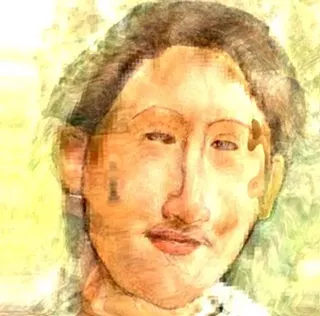"For good," he says. And maybe that's true.
But reviving Coyote Ramblers in Tucson hasn't been easy. Health trouble slowed Tesoriere down, but more critical was his difficulty finding a space where he could operate Coyote Ramblers as a part of Lyric Arts, an organization that at full force will present visual art as well as theater, offer acting and art classes, and put on staged productions and readings.
The company's first staged offerings in Tucson in nearly a decade are coming up Nov. 3-19 in a cozy space at ArtFare. Tesoriere is presenting three short works of his own under the group title American Album, Volume One (Women on the Verge). Volume Two will come later in the season, carrying the subtitle Life on the Edge.
Tesoriere's plays are certainly edgy. "I'm trying to present visceral theater," he declares, "theater that touches people under the skin, not from the neck up, but touches their emotions and gets inside them. A lot of my stories in this production involve the audience being inside the character's life emotionally. And no judgment is placed on the characters at all by me. I'm not supporting them, and I'm not rejecting them."
Some of Tesoriere's characters are people you might turn away from if you met them in real life. In Hot-Wired Highways, a young woman hits the road and tries on various lives. "She's an absolute horror in a relationship," says Tesoriere, "but this woman has a right to her life; she has a right to her choices, and she has a right to be seen in the theater. I wouldn't choose to be personally involved with her, but I have great empathy for her."
Time is a wordless work in which a woman, whose thoughts are elaborated by a dancer, ponders her life as she gets ready for bed. Perhaps the most harrowing play of the evening is Lena's Secret Garden, in which a young couple attempt with very little success to work through a tragedy that threatens their marriage.
Not only in Time, but also in Lena's Secret Garden, silence is every bit as important as words. The second half of Lena's Secret Garden replays the first half with those silences filled in, but even then, Tesoriere isn't interested in connecting all the dots for the audience.
"At times, I think I'm kind of breaking the dramatic structure of the 'well-made play,'" he says, "because I feel the 'well-made play' is a theatrical lie that is meant to pander to the audience.
"My personal aesthetic in writing, and in directing for theater now, is to take risks that reveal more about our own lives through characters on stage--be those risks structural, actors' choices, or putting unpopular but real people's lives up for us to look into. Of course, some experiments are not going to work as hoped, and some are--but all lead to learning and staying awake artistically and furthering personal and professional growth. That to me is most important as an artist and a person. What the hell else are we doing all this for?
"And that is what ArtFare/The Muse is allowing me and other artists of whatever judgmental quality to do, push artistically and present, learn and move along. ArtFare deserves unqualified commendation for that effort."
Tesoriere says he's getting free space and other support from ArtFare in return for recruiting other artists to the facility. It's not exactly a free ride; he has elected to donate whatever income there may be from this show to ArtFare.
Not that he expects to make much, if any, money at this. Upon his return to Tucson, he was dismayed to learn that theater rental had gotten much more expensive than in the 1990s, when he could snag the old a.k.a. Theatre for $50 a night. He thinks this drives up ticket prices beyond the level at which audiences are willing to take a chance on something unusual. Also, he seems disappointed that more actors now expect to be paid for their work--"Trivial money; they can't live on it," he says, but even that runs up production costs without accomplishing much other than maybe boosting the actors' self-esteem a little.
Actors could argue that if they're expected to do professional-level work, they should be paid for their efforts. But Tesoriere would rather collaborate with actors who care less about money than about creating new characters, other lives. "You want to crawl into another skin, not change that skin to fit you," he says.
"One of the problems with the actors here is that nobody takes classes," he complains. "The next work they do on their acting is the next role they get. In bigger cities, the people who are serious about acting are in class one or two times a week, maybe paying $250 a month. They're very serious about practicing their craft. In smaller areas like Tucson, acting is just a little something they do on the side. How good can you be if you just practice once or twice a year?"
So Tesoriere hopes in the next few months to establish such classes with qualified instructors, and maybe feed the better students into his monthly series of readings of things like Mark Ravenhill's dark comic provocation Shopping and Fucking.
Right now, though, Tesoriere is throwing himself into American Album.
"I'm trying to make theater more vital and less prohibitive here," he says. "I am absolutely clear that I will pull small audiences until I build this up, but I'm going to fill that gap and produce honest stories about people who are out there and what their aches are. I will be very happy on any night I have 30 people in the audience."








